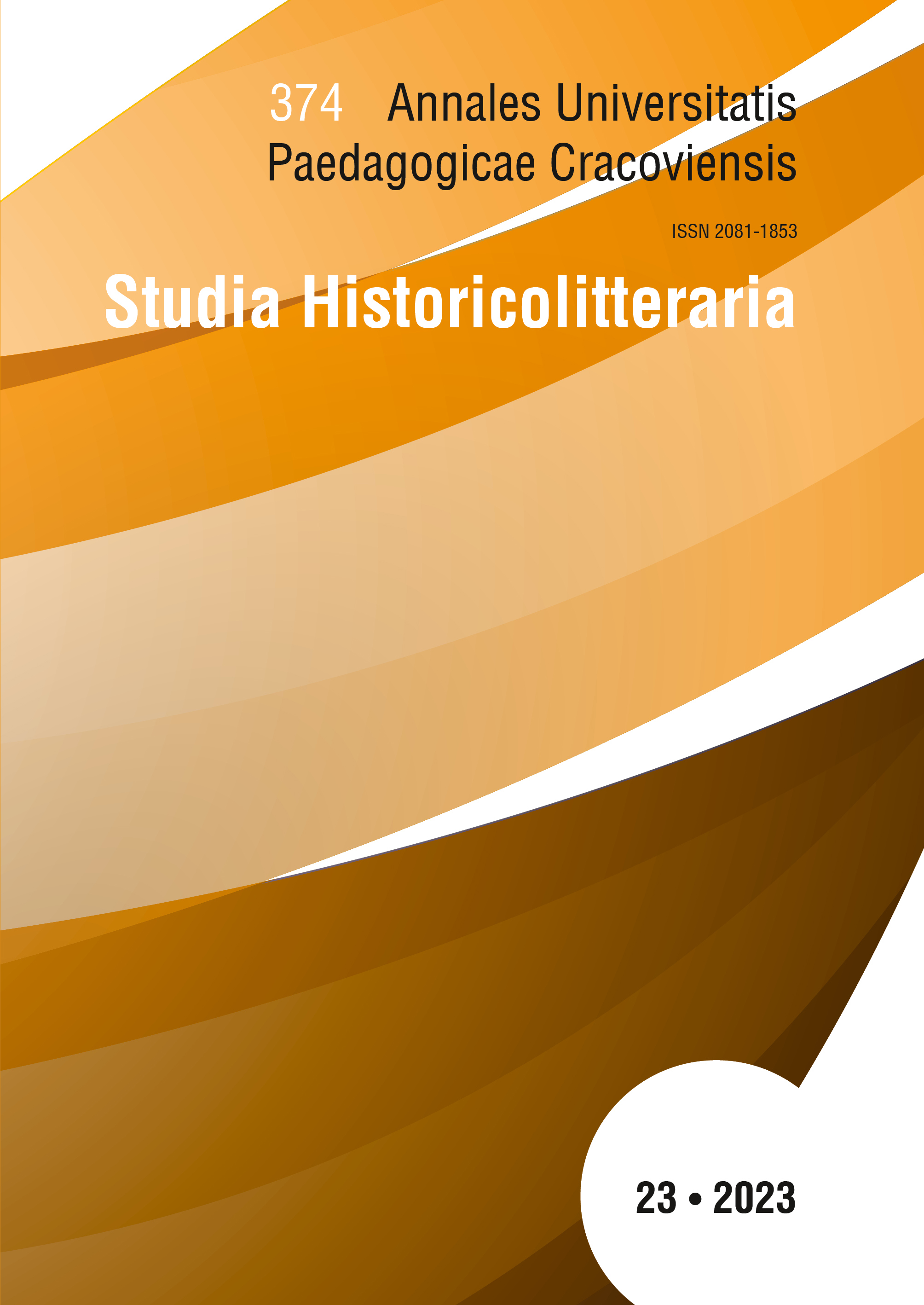Grunt to historia? Vicente Luis Mora i jego "Centroeuropa" (2020) jako metapowieść intrahistoryczna
Main Article Content
Аннотация
The purpose of the essay is to introduce the figure of a contemporary Spanish author, Vicente Luis Mora, and his novel Centroeuropa to the Polish literary researchers, as well as to analyze the special character of this novel in terms of reading agreement and the most adequate terminology concerning the literary genre, to which it belongs, based on the form oftypological characteristics of a novel that includes ten essential points: paratext, plot, narration, time structure, poetics, the question of mimesis, the loyalty of history towards History, metatextuality, ideological character and the strategies used by the author. On the basis of these reflections it can be concluded that Centroeuropa by Vicente Luis Mora is a metanovel about a man who is looking for his way in a breakthrough moment in the history of Europe, between the 18th and 19th century, in the declining feudal‑absolutist Prussia and the emerging liberal‑capitalist Prussia, in the embryonic society, where economic and political norms haven’t been fully constructed yet and women are not full‑fledged members of society. Centroeuropa is a multi‑dimensional novel inspired by the past of Central Europe, but – above all – a metanovel about writing and its servitude.
Скачивания
Article Details

Это произведение доступно по лицензии Creative Commons «Attribution-NonCommercial-NoDerivatives» («Атрибуция — Некоммерческое использование — Без производных произведений») 4.0 Всемирная.
ПОЛИТИКА АВТОРСКИХ ПРАВ
Издатель «Annales Universitatis Paedagogicae Cracoviensis. Studia Historicolitteraria» имеет право использования и распространения всех опубликованных в издании материалов на основании договора неограниченной во времени неисключительной лицензии - предварительно заключенного на неоговоренное время с каждым автором конкретного произведения на оговоренных в том договоре условиях использования.
ПОЛИТИКА ОТКРЫТОГО ДОСТУПА
«Annales Universitatis Paedagogicae Cracoviensis. Studia Historicolitteraria» это издание с открытым доступом, а все его содержание доступно бесплатно для пользователей и организаций на основаниях неисключительной лицензии CreativeCommons (CC BY-NC-ND 4.0). Пользователи могут читать, скачивать, копировать, распространять, производить поиск или переходить по ссылкам к полным текстам статей в этом издании без предварительного согласия издателя либо автора при условии указания источника доступа и авторства данной публикации. Это согласуется с определением открытого доступа BOAI (http://www.soros.org/openaccess).
Библиографические ссылки
Barthes R., Dyskurs historii, przeł. A. Rysiewicz, Z. Kloch, „Pamiętnik Literacki” 1984, z. 3, s. 225–236.
Barthes R., Le discours de l’histoire, [w:] Le bruissement de la langue, Essais critiques IV, Paris 1967, s. 163–177.
Bremond C., Kombinacje syntaktyczne między funkcjami a sekwencjami narracyjnymi, przeł. W. Kwiatkowski, „Pamiętnik Literacki” 1968, z. 4, s. 285–291.
Cichocka M., Estrategias de la novela histórica contemporánea. Pasado plural, postmemoria, pophistoria, Frankfurt am Main 2016.
Fernández‑Prieto C., La Historia en la novela histórica, [w:] Reflexiones sobre la novela histórica, red. J.J. Morales, J. Jurado, Cádiz 2006, s. 165–184.
Genette G., Palimpsestes, Paris 1982.
Genette G., Palimpsesty: literatura drugiego stopnia, przeł. T. Stróżyński, A. Milecki, Gdańsk 2014.
Genette G., Seuils, Paris 1987.
González García J, „Centroeuropa” (2020) de Vicente Luis Mora: una mirada al mundo femenino desde el modelo de la „nueva masculinidad”, „Revista Letral” 2023, n. 30, s. 5–19.
Hutcheon L., A Poetics of Postmodernism: History, Theory, Fiction, New York 1988.
Hutcheon L., Historiographical Metafiction. Parody and the Intertextuality of History, [w:] Intertextuality and contemporary American fiction, eds. P. O’Donnell, R. Con Davis, Baltimore – London 1989, s. 3–32.
Kermode F., Sekrety i narracyjne sekwencje, przeł. P. Czapliński, „Pamiętnik Literacki” 1993, z. 2, s. 174–192.
Lefere R., La novela histórica: (re)definición, caracterización, tipología, Madrid 2013.
Martín J.M., Vicente Luis Mora: „Intento abrir los horizontes del lector en lugar de cerrarlos”, „Diario de Córdoba”, 29.09.2020, https://www.diariocordoba.com/cultura/2020/09/29/vicente‑luis‑mora‑abrir‑horizontes-35934724.html [dostęp: 15.06.2023].
Menton S., La Nueva Novela Histórica de la América Latina 1979–1992, México 1993.
Mora V.L., Ensayos a La Intemperie, „Trama & Texturas” 2018, n. 36, s. 15–32, https://www.jstor.org/stable/26524842 [dostęp: 15.06.2023].
Mora V.L., Centroeuropa, Barcelona 2020.
Rivas L.M., La novela intrahistórica: tres miradas femeninas de la historia venezolana, Valencia 2000.
Rodríguez D., La revista „Quimera” juega a ser un ‘hoax’ de internet en papel, „El País”, 24.09.2010, https://blogs.elpais.com/trending‑topics/2010/09/revista‑quimera‑hoax‑papel.html [dostęp: 11.11.2023].
White H., Metahistory: The Historical Imagination in Nineteenth Century Europe, Baltimore – London 1973.
White H., Problem narracji we współczesnej teorii historycznej, przeł. M. Wiewiórkowska, H. Ogryzko‑Wiewiórkowski, [w:] Metodologiczne problemy narracji historycznej, red. J. Pomorski, Lublin 1990, s. 25–61.
